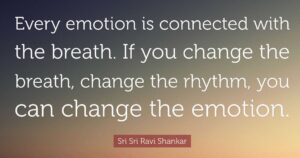Every breath you take…

We are deficient in proper deep breathing and this deficit affects oxygenation of all our tissues. Were you aware that the brain uses 20% of our oxygen and we regularly take in excess of 20,000 breaths per day? We are leading increased sedentary lives due to prolonged sitting and a deficit in movement and our postures are being compromised. Our respiratory system is under siege due to the forward slump posture of sitting and this compresses the lungs and diaphragm which adversely affects proper respiratory biomechanics and function. Short and shallow breathing which occurs when we sit, keeps us alive but it is similar to being in the “fight/flight” mode of sympathetic nervous system adaptability where the body is in a state of stress. We need to make attempts to really concentrate on a handful of deep breaths regularly throughout the day which will bring our bodies towards a calm plateau resulting in better mood, sleep and digestion and more relaxed muscles and organs, including the heart and brain.
The best way to deep breathe is to stand up and assume a correct posture, breathe in through the nose for a count of five seconds and feel the diaphragm lowering into the abdomen. Hold for 2-3 seconds then exhale through the mouth for 7 seconds. Repeat this 5-6 times whilst holding your correct posture. You can use this breathing technique also when you need to calm down and avoid a “knee jerk reaction” where you would usually admonish or criticise someone during a stressful exchange.
Regular deep breathing exercises will change your physiology and the following beneficial results will be obtained:
-lowered blood pressure and heart rate.
-reduced levels of stress hormones in the blood.
-reduced lactic acid build-up in muscle tissue.
-balanced levels of oxygen and carbon dioxide in the blood.
-improved immune system functioning.
-increased physical energy
-increased feelings of calm and wellbeing.
Pranayama is an ancient breathing technique that originates from yogic practices in India. It involves controlling your breath in different styles and lengths. It has more recently gained popularity in the western world because of the many health benefits that come from a pranayama practice. Alternate nostril breathing is an easy daily breathing exercise which you will find useful in calming down and relaxing the whole body.
Simply inhale whilst closing the right nostril so that all the air is being inhaled via the left nostril. Feel the diaphragm lowering in the abdomen and hold the breath for 5 seconds and then release the right nostril and close the left nostril so that all the air in your respiratory tree is being exhaled out of the right nostril. Try to make the exhalation last for more than 5 seconds and obviously repeat the action with the opposite nostril so that there is an even cycle. You can stay with this daily exercise for 5-10 minutes and the yoga philosophy is to sit with crossed legs and an erect spine however if this is not possible you can stand and carry out the same actions.


